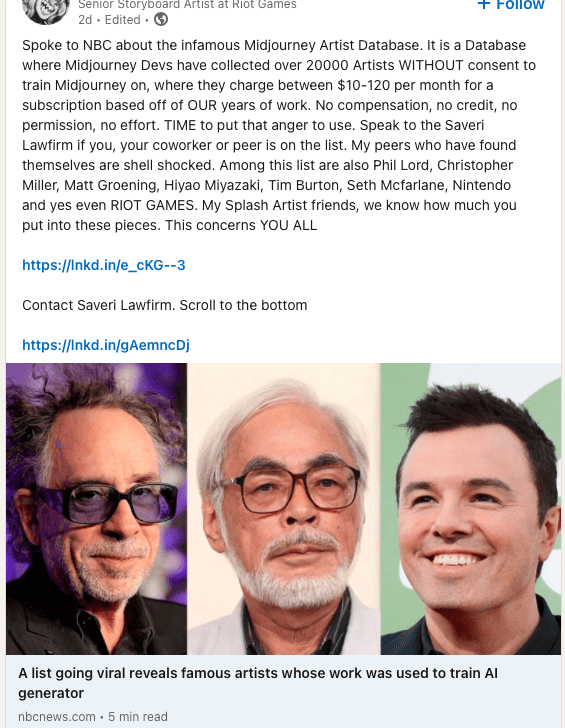
If last year was a party of generative AI hype thrown by the Big Tech boys, then 2024 sees people waking up sober and realising that the value of AI is all in the data. Which is great news for Jersey’s incipient data trust sector.
ChatGPT/Open AI may have launched the generative AI party but lots of others stopped by with their shiny new algorithms (the most famous being Google’s Bard and Anthropic’s Claude). Meanwhile the cool kids (the image generators – Stability AI, Midjourney and Runway invited by Dall-E) were already drunk in the kitchen having got going much earlier. Things got totally out of hand when Meta let its Llama (large language model) go viral and suddenly open-source copycats were everywhere. While this entertaining spectacle was playing out some of the uninvited started to realise that the party was built on a bonfire of their intellectual property rights and that they were paying the bill.
Which brings us to today with numerous lawsuits popping up as copyright owners discover their work has been used to train algorithms and seeking to sue the tech companies for the damage. In just the last couple of weeks it has come to light that:
- The New York Times is suing Open AI and Microsoft for ‘billions of dollars’ (after commercial negotiations apparently broke down) claiming that is the level of commercial damage inflicted by Open AI using millions of its copyrighted articles to train its GPT models.
- And a group of US artists are using a leaked internal list of 20,000 artists whose art Midjourney allegedly used to train its models to recruit to a class action lawsuit which states that ‘AI image products are trained on vast numbers of copyrighted images without consent, credit, or compensation and violate the rights of millions of artists’.

With huge financial rewards at stake the tech companies are fighting back hard armed to the teeth with copyright lawyers. Then last week the Daily Telegraph revealed that OpenAI has been lobbying the UK parliament to change its copyright laws to give them unfettered free access to copyright works. They put forward a remarkable argument which seems to amount to ‘We should be able to use other people’s property for free because otherwise our products won’t work…’. Quite why the usual rules of capitalism should be suspended for these businesses (i.e. paying to access other people’s property) is not clear. Aside from the inequity of simply helping themselves to other people’s intellectual works the tech companies’ current tactics are spectacularly short-sighted. This is because generative AI tools will need an on-going stream of original, high-quality data to continue to function. Without the cooperation and endeavours of human creatives these products will atrophy and if the creatives have all gone off to drive Ubers then the tools will grind to a halt. Which is why Jersey is positioned to play a key role in the future of AI through the provision of data trusts.
The reality (that OpenAI don’t want to admit) is that the algorithmic structures underpinning new AI tools are relatively simple and very easy to reproduce. Undoubtedly (and as highlighted by the lobbying efforts) what makes these tools so powerful is the amount and variety of data used to train them. While ChatGPT is the most famous there are already hundreds of generative AI models being deployed around the world and we can expect that number to grow with many more models built and trained for specialist applications. All these models will require on-going access to a pipeline of specialist data/creative works to function.
In this future lies the opportunity for Jersey. Jersey data trust structures offer an excellent vehicle to combine data from multiple Intellectual Property owners and make it available in a carefully controlled fashion for training algorithms in return for payment. By combining data from multiple sources, the database in a trust becomes more valuable and the trustee can negotiate commercial terms with prospective licensees from a much stronger position.
The seeds of this future are already sown: The EU which is leading the way on AI regulation is planning to protect copyright holders moving forward. The draft EU AI bill was signed off in early December and will offer new controls for copyright holders – namely the ability for copyright owners to withhold consent for their works to be used for AI training and mandating that tech developers publish information about what data was used during algorithmic training.
This will kick-start the market for training data and Jersey should get stuck in. An enterprising Jersey trust company might do well to establish a digital art data trust and invite all 20,000 artists featured on the Midjourney artist list to sign up their future work. And that would be just the start, because there will be numerous opportunities for specialist creative Jersey data trusts empowering artists, authors and musicians to financially benefit from the power of their creative endeavours.
This is a unique opportunity for Jersey to support intellectual property owners to participate in this new market as the leading data trust jurisdiction:
- Jersey is the pioneer of data trust structures based on its unique trust laws. Jersey data trusts are easy to establish and inherently flexible. Any number of data providers (for example artists, authors or musicians) can contribute data to a trust with the trustee stewarding the database and facilitating data sharing with approved third parties according to the purposes of the specific trust (for example with eligible technology companies for training AI algorithms according to certain commercial terms and restrictions).
- As a world leading trust jurisdiction Jersey houses numerous trust companies all regulated by the Jersey Financial Services Commission. These firms field professional trustees experienced in fulfilling their fiduciary duties, exercising good governance and managing assets. Artists and other data and intellectual property owners can rely on Jersey trustees to manage their data safely, securely and according to the explicit governance rules laid out in the purposes of the trust. Furthermore, the trustee is responsible for ensuring that third parties who use the trust’s database fulfil their commercial and contractual obligations and restrictions removing the burden of policing copyright use from individual artists.
- A data trust can be commercially active and generate financial returns for the Intellectual Property or data providers or other stakeholders in a similar way to Jersey Property Unit Trusts seen in the high value real-estate sector. In this way, we might expect the value of a data trust to grow through time and for the copyright holders to benefit accordingly.
This is just one of numerous commercial use-cases for Jersey data trusts which Digital Jersey is currently exploring in collaboration with the island’s trust and technology sector. I’m excited to see which trust company will pick this up first. So, if you’re a Jersey trust practitioner and would like to explore this further, please do get in touch [email protected] Meanwhile I’m off to grab some popcorn for the case of New York Times vs OpenAI.
Rachel Harker acts as Technology Development Consultant to Digital Jersey. She has spearheaded the work on Data Stewardship Services in Jersey and is the architect of LifeCycle data trust.




